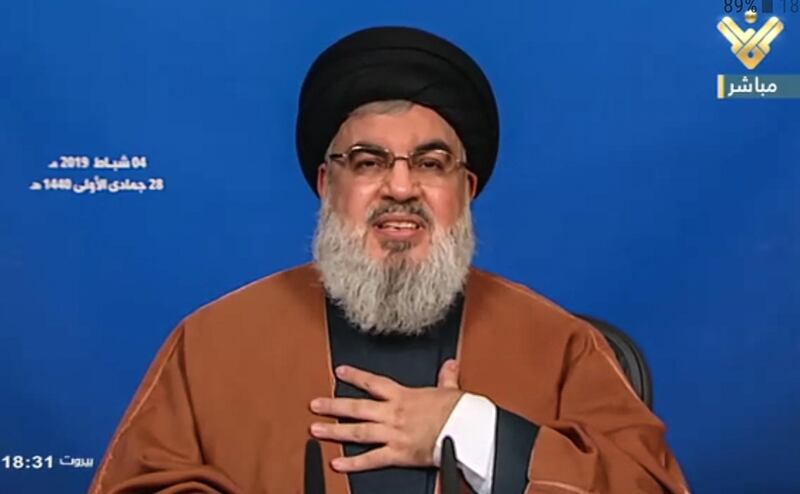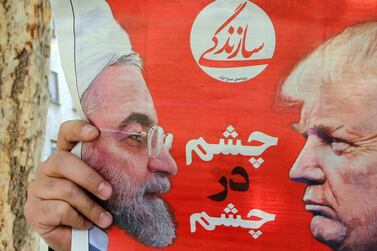Hezbollah leader Hassan Nasrallah warned that his movement would respond to the Trump administration designating Iran's Revolutionary Guard Corps (IRGC) as a terrorist group earlier this week, a move which will weaken Iran's position in Syria to Russia's advantage, analysts say.
“At the right moment there will be an appropriate reaction," Mr Nasrallah said on Wednesday night, quoted by the Lebanese state-run National News Agency (NNA).
“It our right and moral duty to face all those that, by their actions, threaten our people, our country, and our resistance.”
Mr Nasrallah said the Iran-backed Lebanese group might be “patient” today, but that did not mean that it cannot “play strong cards” in the future.
Analysts fear that the designation of the IRGC as a terrorist organisation will push Hezbollah and its allies to increase violence in the region.
“I believe some form of violence is to come," said a Lebanese analyst who requested anonymity because of the sensitivity of the subject. “Not reactionary violence, but may be attacks on US interests in the region through proxy groups. Hezbollah won’t claim them, but it will be clear they are behind them."
In his speech, Mr Nasrallah castigated the US for classifying the IRGC as a terrorist organisation, which he described as an “official military institution of a state recognised by the whole world”.
“This is a natural step for the Great Satan," he continued. “They want to re-design the Middle East”.
Mr Nasrallah also defended Hezbollah's Lebanese political ally Amal, which may be facing sanctions in the near future, US officials told The National last week.
“There are Lebanese in Washington working towards putting friends and allies of Hezbollah on a terror list," he acknowledged, saying he supported Amal leader Nabih Berri when he said in Doha earlier this week that the only “path to salvation” is “unity and resistance”.
Despite Hezbollah’s rhetoric, analysts say that Iran’s regional position will be significantly weakened by America’s move against the IRGC, especially in Syria, where it supports Bashar Al Assad’s regime.
"Their support in Iraq, Syria and Lebanon will dramatically decrease as people fear being targeted by Israeli air strikes," Abdullah Al Mousa, a researcher specialised in Syrian military affairs, told The National.
Israel has repeatedly targeted Iranian interests in Syria, although it rarely admits doing so.
Mr Al Mousa said the IRGC wields significant power in Syria, with “members in all vital facilities and military bodies”.
But its strength and efficiency in Syria will decrease as external funding dries up.
Ahmad Rahal, a Turkey-based military analyst, said the IRGC’s ally Hezbollah, which has sent thousands of fighters over the border to support the Damascus regime, will also see its vehicle movements, fuel and food expenses limited. “This will manifest itself in the months to come."
The fuel crisis, which has hit regime-controlled regions hard this winter, will increase this year, according to Mr Rahal. Syrian companies dealing with the IRGC or Iran will probably limit their activities out of fear of being exposed to US sanctions.
Even though the Assad regime now controls two-thirds of Syria, the country's main oil and gas fields remain out of government control in the Kurdish-held north-east of the country, and western nations are working to restrict oil-related imports.
In November, the US Treasury issued a new advisory threatening penalties against those "involved in petroleum-related shipping transactions with the g
overnment of Syria".
However, the US designation of the IRGC as a terrorist organisation will not push Iran out of Syria entirely, despite reducing its influence.
"Assad's regime and the IRGC will not be affected much as Iran is relying on low-cost followers recruited in the early years of the war," said Syrian researcher Ahmad Abazaid, who focuses on ISIS and other extremist groups in the country.
The biggest winner from US sanctions against the IRGC will be Russia, which changed the trajectory of the Syrian conflict in favour of Mr Al Assad in 2015, analysts say.
Iran's already struggling economy is currently grappling with the reimposition of full US sanctions last November.
“Russia will take over smoothly, taking advantage of the besieged Iranian economy," said Mr Al Mousa. “Russia will be able to invest more alongside its local partners to strengthen its position in Syria."
Competition for control of Syrian assets has recently increased between Russia and Iran, with Iran set to take over Syria’s main commercial port, Latakia, in October.
“There is a hidden war between Russia and Iran, who are competing to take over oil and industrial investments," said Mr Rahal.
The two countries also support local armed groups and weakening Iran will hurt its military operations on the ground, probably shifting the power balance to the advantage of Syria's elite Russian-backed Tiger Forces.
“The Tiger Forces will be able to lay their conditions which will strengthen Russian popularity among locals eager to apply their propaganda on the ground," Mr Rahal said.
However, Russia and Iran will still need to capitalise on their alliance in the region despite their differences, says Philip Smyth, a fellow at the Washington Institute. “One must still keep in mind that Tehran and Moscow are strategic partners in the region," he said.
“There may be competition between the two countries in terms of backing [armed] groups and creating overlapping patronage networks," Mr Smyth said, but Moscow still needs Iranian-backed boots on the ground to secure its gains in Syria.






